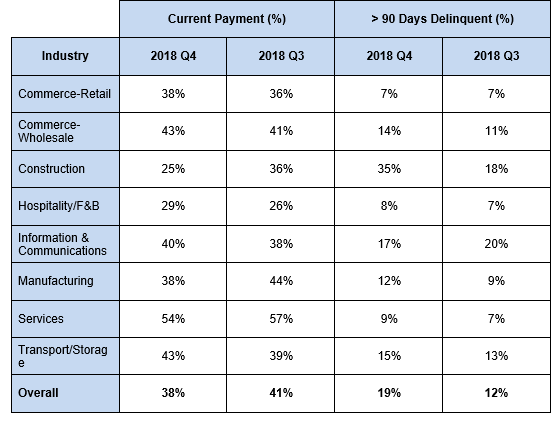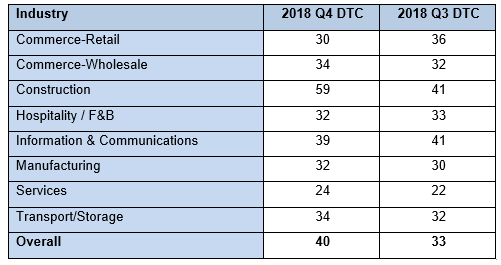- The Construction sector was the hardest hit with significant increases in Days Turned Cash (DTC) and delinquent payments, but its impact was mitigated by payment behaviour that has remained largely stable across other sectors
- Data for 4Q18 also points to a modest increase in DTC across most sectors from 3Q18
SINGAPORE, 18 March 2019 – Debt payments in 4Q18 remained generally stable across SMEs in Singapore, but were impacted by a significant number of delinquent debts stemming from the Construction sector.
The findings on SME payment behaviour were revealed in a report released today by DP Information Group (DP Info), part of Experian. The report analyses the payment patterns of more than 120,000 companies in Singapore across eight major sectors (Retail, Wholesale, Construction, Hospitality/F&B, Information & Communications, Manufacturing, Services, Transport/Storage) during 4Q18.
Only 25 per cent of construction debt were paid on time, down from 36 per cent in 3Q18. The percentage of delinquent debt over 90 days for the Construction sector, at 35 per cent, represented close to a twofold increase from 18 per cent from the previous quarter. With the exception of the Construction sector, delinquency rates remained largely stable across SMEs.

The overall Days Turned Cash (DTC) National Average – a measure of the payment behaviour of SMEs – saw a quarter on quarter (QoQ) increase from 33 to 40 days, indicating a lengthening of payment settlement timelines for SMEs in Singapore. While most sectors witnessed a modest increase in DTC of approximately two days, the Construction sector registered a QoQ DTC increase of 18 days. This was the key contributor to the overall lengthening of payment settlement timelines among Singapore SMEs and represented the highest DTC for the Construction sector in the last five years.

Activity within the Construction sector has been weak in recent years, largely attributed to lower than anticipated construction demand for both the private and public sectors. However, 2018 saw an upturn of 23 per cent in construction demand1. This was mainly driven by Government-led public sector projects, with the Building and Construction Authority (BCA) expecting this sustained public sector demand to continue into 20192.
However, smaller local companies are still expected to face challenges as many infrastructure projects are being assigned to larger companies. The impact of smaller profit margins from these smaller firms may have led to the rise in delinquent payments among construction companies.
Mr James Gothard, General Manager, Credit Services & Strategy SEA of Experian said: “The payment behaviour across the majority of the sectors tracked suggests that despite the emergence of business headwinds at the tail end of 2018, most SMEs were still able to maintain sufficient cash flow to service their payment obligations in a relatively timely manner. However, SMEs will potentially face bigger challenges in 2019 as uncertainties in the business environment are expected to persist, leading to the management of cash flow, liquidity, and credit risk remaining as top business concerns.”
DP Info’s SME Development Survey 20183 found that half of the SMEs surveyed had anticipated challenges in managing cash flow, liquidity, and credit risk for the year ahead. The survey also determined that 81% of SMEs with financial challenges cited delayed payments from customers as the main reason behind this difficulty.
“With finance related challenges constantly identified by our studies as a key concern for SMEs, it is heartening to see Budget 2019 introduce initiatives specifically aimed at easing SMEs’ access to credit and financing. This access to capital is also likely to prove vital as firms embark on productivity improvements and business transformation plans to retain their competitive edge in a challenging business environment,” added Mr Gothard.
[1]: Ministry of National Development: Speech by MOS Zaqy Mohamad at the BCA-REDAS Built Environment and Property Prospects Seminar 2019
[2]: Building and Construction Authority: Singapore’s Total Construction Demand To Remain Strong This Year
[3]: Experian: Singapore SMEs Responding to Calls for Transformation to Drive Business Sustainability
